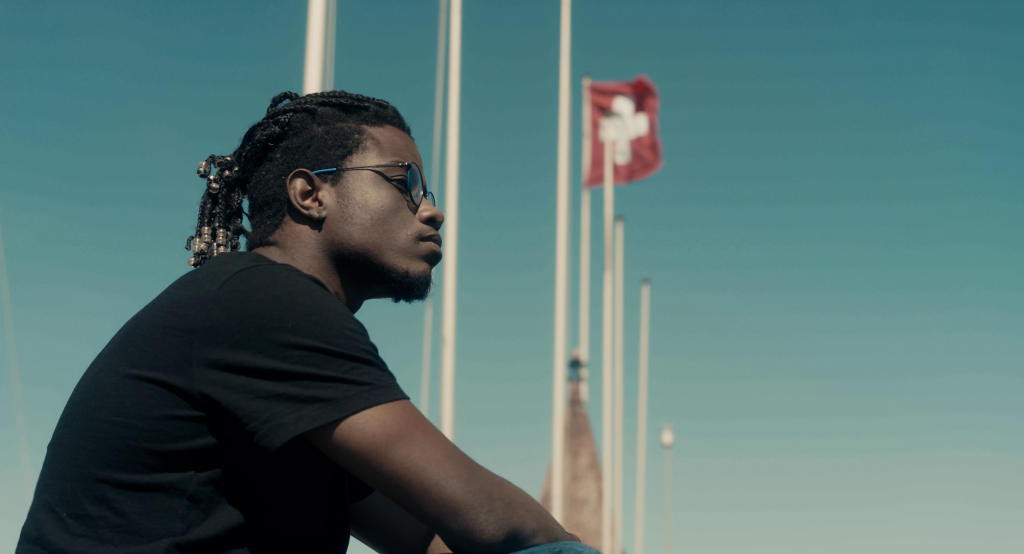Some stories start in a single room. Others cross oceans. Pipo Alone in the World, the new docufiction from Swiss-based filmmaker Mohamed Feki and Franco-Swiss producer François Burnand, does both. It opens in a quiet corner of Haiti, where a boy named Pierre Paul has already survived more than most adults could imagine — and then carries him across borders, cultures, and the vast Atlantic, all the way to Switzerland.
Pierre Paul’s life was shaped by violence long before the journey began. His parents, members of local gangs, turned against him when he was still a child. After they tried to kill him, they abandoned him entirely. He was taken in by his aunt, who raised him alongside his little cousin. That fragile stability ended the day his aunt was murdered. The loss left him with no family he could safely return to — and no choice but to run.
The route was never direct. His escape wound through the Dominican Republic, across open water, and into the shifting landscapes of Europe. Along the way, Pierre Paul encountered people who offered food, shelter, or a moment’s kindness — and others who offered nothing but suspicion. “Migration is often spoken about in numbers,” Feki says. “But numbers have no face. I wanted audiences to breathe at his rhythm, feel the silences, the fear, the sudden bursts of hope.”
The film blends real-life testimony with dramatic reconstruction. Feki calls this approach “docufiction” — a hybrid that gave him room to show what no camera had captured: Pierre Paul’s childhood, the private moments of grief, the unlit roads he walked at night. “Some truths are impossible to film in the moment,” he says. “But they can be rebuilt faithfully, with respect for the person who lived them.”
That respect is evident in the way the camera lingers. The violence is not hidden, but it is never exploited. Instead, the audience is left with the weight of what happened, not the spectacle of it. Feki credits this restraint to his own sense of responsibility as a storyteller. “Honesty is a duty,” he says. “Dignity is a responsibility.”
At the heart of the production is François Burnand, a Franco-Swiss producer, professional actor, and accomplished entrepreneur. With a background in theatre and cinema, François has appeared in numerous acclaimed films and stage productions, earning a strong reputation for his craft and artistic sensibility. Driven by a passion for storytelling and a sharp eye for quality cinema, he combines his artistic experience with business acumen to develop ambitious, high-value film projects.
It was François who first introduced Feki to Pipo and his extraordinary story. From that moment, the two decided to collaborate, united by a shared vision: delivering powerful, authentic, and universal stories where emotion and artistic excellence guide every decision. François’ deep commitment — from development through post-production — has shaped the film at every stage.
The production, entirely Swiss, worked around significant limitations. Filming in Haiti was impossible due to safety concerns, so Feki collaborated with a trusted local team to capture authentic footage from the country. Key scenes were then recreated with meticulous detail to match the textures, colors, and light of Haitian streets and homes. Swiss locations, by contrast, were shot as they are — unaltered — to underscore the emotional and visual shift between the two worlds.
For Feki, born in Sfax and honored in 2017 as the youngest film director in Tunisia, Pipo Alone in the World marks a deepening of his craft. “Early in my career, I wanted to prove I could tell powerful stories,” he reflects. “Now I want to understand, to connect, to transform.” His earlier short films earned national and international awards, but this feature-length work pushes further into the human realities behind political headlines.
The title may suggest isolation, yet the film is full of connections — fleeting, fragile, sometimes wordless — that keep Pierre Paul moving forward. The end of his journey, in Switzerland, is not a neatly tied conclusion. It is, as Feki puts it, “a breath, not a resolution.” Survival is only the beginning of another set of challenges.
In that way, Pipo Alone in the World refuses to offer the comfort of a fully closed story. It insists on showing that arrival in a new country is not the end of migration — it’s the start of rebuilding, often in the shadow of loss. “Borders aren’t just on maps,” Feki says. “They’re in our minds — in fear, in prejudice, in the ways we decide who belongs.”
The film’s emotional pull lies in its specificity. This is not an abstract account of displacement, but one boy’s lived reality. By focusing on the details of Pierre Paul’s path — the rooms he slept in, the water he crossed, the faces he met — the film draws viewers into an experience they might otherwise hold at a distance.
With its October 2025 release planned for human rights film festivals, the project is already drawing interest for both its cinematic approach and its social resonance. For Feki and Burnand, the hope is that the film will create a bridge between audiences and those still on the move, those still searching for safety. “I hope young people who see this, in Haiti or anywhere, feel that their life matters,” Feki says. “That courage isn’t about winning — it’s about getting back up.”
The official trailer offers a glimpse of the film’s unvarnished intimacy: https://www.youtube.com/watch?v=KSprg1chdiU
Pipo Alone in the World stands as both a portrait and a question. It asks what freedom really costs — and what it means to keep moving when home is no longer a place you can return to.



